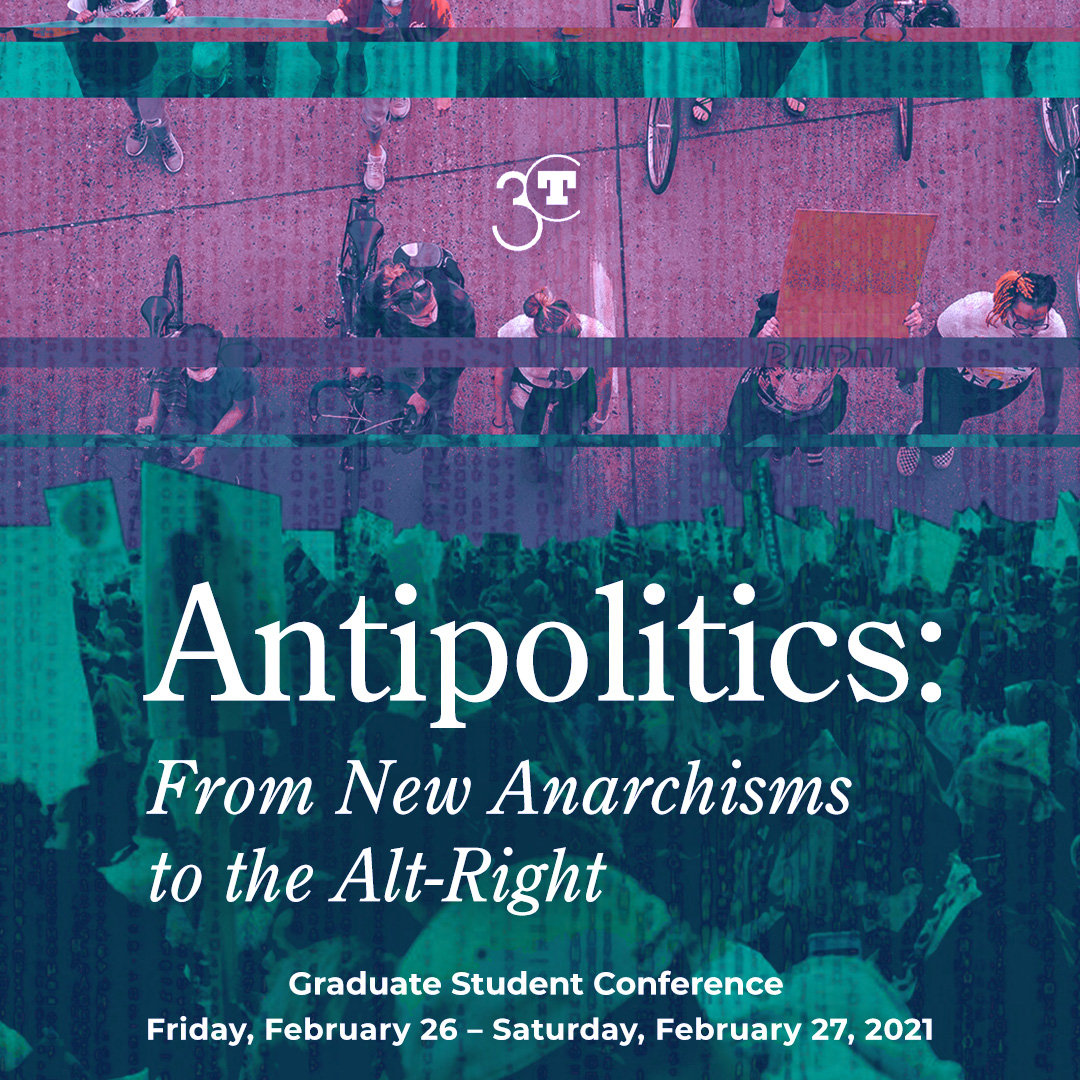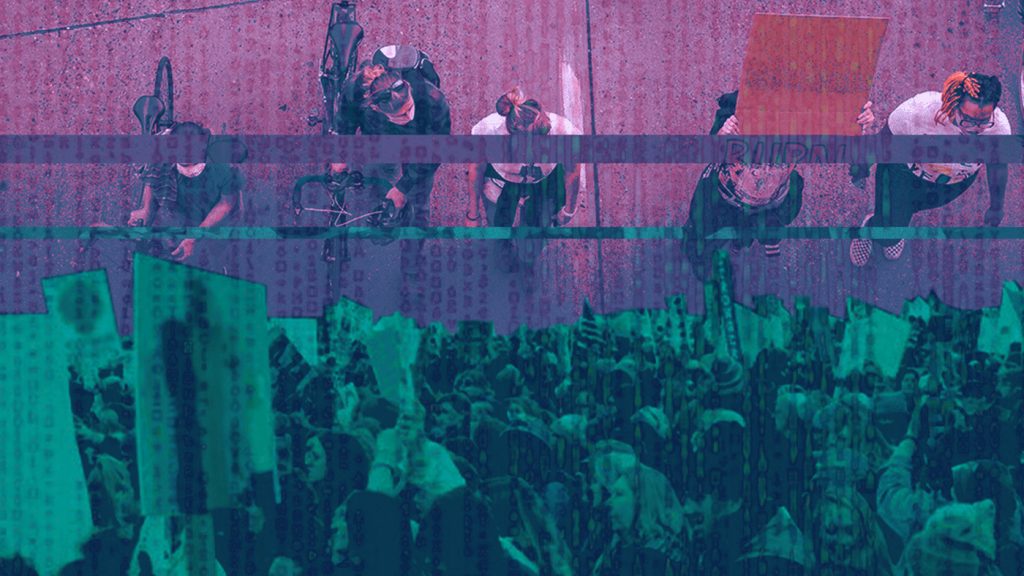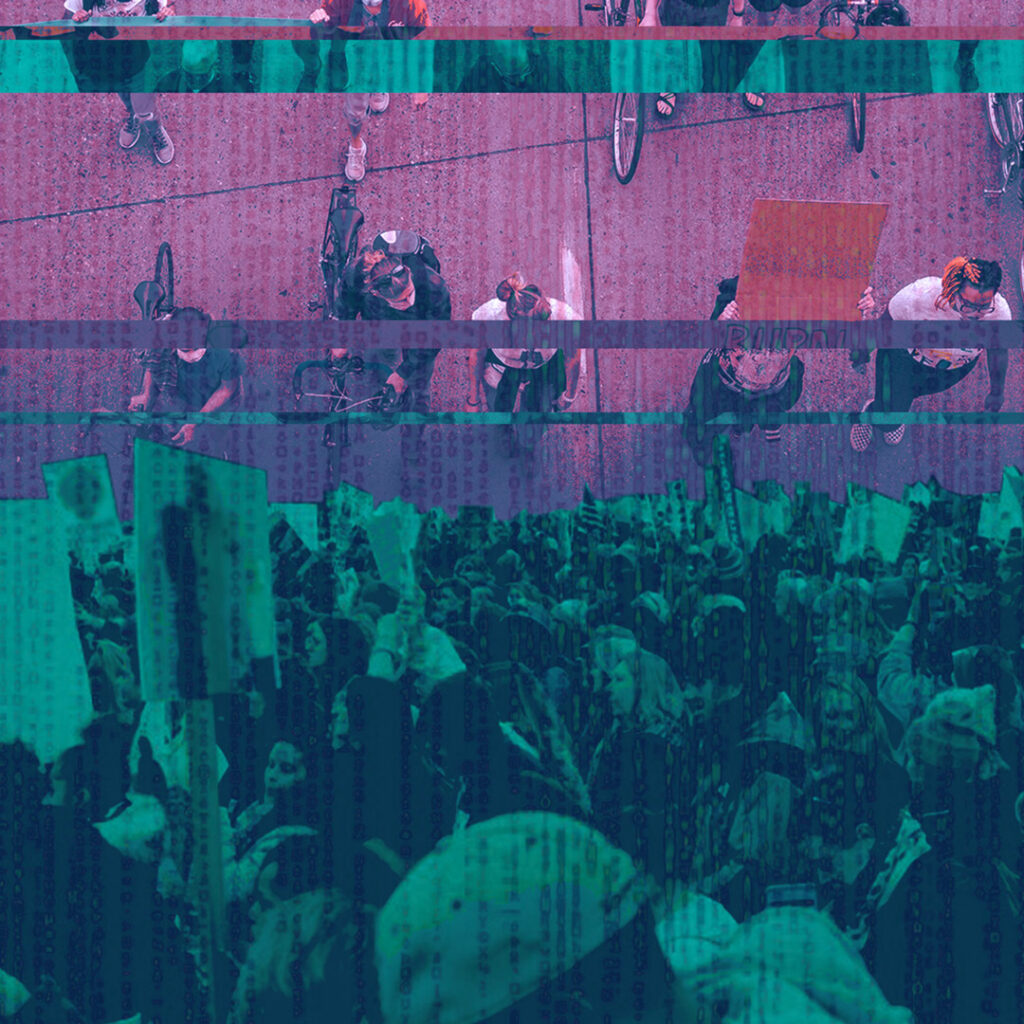Categories
Antipolitics: From New Anarchisms to the Alt-Right
Friday, February 26, 2021, 1:00-7:00pmSaturday, February 27, 2021, 11:00am-7:00pm
This conference seeks to analyze the emergence of new forms of antipolitics over the last several decades. If politics has meant many things to many people, from statecraft and representation to movements for social change, antipolitics names an array of practices, discourses, and structures of feeling linked by the contention that politics is a dead end.
Antipolitics typically involves a rejection of the state and electoralism. It can also name a refusal of hierarchy, governance, and mediation more broadly. In theory, it runs the gamut from Deleuze and Guattari’s provocation “There is no ideology and never has been” to some forms of Afropessimism, affect theory, and new materialism. In struggle, it’s evident in ultraleftisms and anarchisms, from Athens to Chiapas to Ferguson. The proliferation of mutual aid networks during the COVID-19 pandemic may be antipolitical. So, too, the horizontality of many Black Lives Matter actions, occupations of public space, and housing struggles.
But antipolitics also holds sway on the right, as in libertarian populisms and alt-right discourses excoriating the “deep state,” liberal technocrats, and identity politics. Politicians themselves can be antipolitical: Trump and Bolsonaro have been described in such terms, and they certainly aren’t the first to run on repugnance for something referred to pejoratively as “politics.”
All told, there may be nothing inherently radical about antipolitics, for aversion to the political is in many ways the most socially neutral posture imaginable.
The conference will close with a roundtable discussion featuring University of Chicago faculty members Lauren Berlant, Leah Feldman, and Ryan Cecil Jobson.
This is a 3CT-supported graduate student conference organized by Jack Chelgren, Esther Isaac, and Lily Scherlis.
FRIDAY, FEBRUARY 26, 2021
1:00-1:30pm — Greeting and introductions
1:30-3:00pm — Panel 1: Contested Spaces
“Radical Therapeutics in the Aftermath of the Opiate Crisis”
Tracy Brannstrom, Comparative Human Development, University of Chicago
“De|Signs of Anti|Politics: Designing Political Agony into Thailand’s Ecstatic Parliamentary Architecture”
Taylor Lowe, Anthropology, University of Chicago
“‘In the World, Not of It’: The Architecture of Amish Autonomy in the United States”
Charlotte Murtishaw, History, University of Massachusetts, Amherst
“‘Bigger Than You and Me’: Geopolitical Games, Collective Action, and the Affects of Political Helplessness in Contemporary Lebanon”
Omar Safadi, Political Science, University of Chicago
3:00-3:30pm — Short Break
3:30-5:00pm — Panel 2: Unruly Aesthetics
“A Very Short History of Pictures of Prison Walls, Crumbling and Otherwise”
Luke Fidler, Art History, University of Chicago
“Situating Antipolitics: Kara Walker’s Black Dimensionality”
Wyatt Sarafin, English, Harvard University
“Deadpan Sonnets: Care, Caress, and Guardedness in Wendy Trevino’s Cruel Fiction”
Jesslyn Whittell, English, University of California, Los Angeles
5:00-6:00pm — Break
6:00-7:00pm — Roundtable 1: Antipolitical Organizing
John Hieronymus
National Nurses United, Tenants United Hyde Park/Woodlawn, Industrial Workers of the World, Libertarian Socialist Collective
Kait Murphy
Greater Chicago Industrial Workers of the World, Chicago Teachers Union
Andrea Yarbrough
in ℅: Black women
SATURDAY, FEBRUARY 27, 2021
11:00am-12:30pm — Panel 3: Political Philosophy Revisited
“Platonic Reversals: The Populism of Deleuze and Rancière”
Felicia Jing, Political Science, Johns Hopkins University
“On Cutting Politics Down to Size: Oscar Wilde, New Materialism, and the Problem of Truth in Politics”
Harel Newman, Comparative Thought and Literature, Johns Hopkins University
“From Anti?politics to the Non-Political: On Non-Philosophy’s Democracy”
Jeremy Smith, Centre for Theory and Criticism, Western University
“Reification in Reverse”
Mitch Therieau, Modern Thought and Literature, Stanford University
12:30-1:30pm — Break
1:30-3:00pm — Panel 4: Dissident Extremes (Right and Left)
“Notes on the Alt-Right and the Aesthetics of Belief”
Dana Glaser, English, University of Chicago
“Varieties of Antipolitics? The Significance of Online Mediation in the German Anti-Refugee and Anti-Containment Mobilizations”
Anna Lea Berg, Sociology, University of Chicago
“Fascism as White Antipolitics: George Jackson, Cedric Robinson, and Political Friendship”
Huey Hewitt, African and African American Studies, Harvard University
““Disaster for the Human Race:” The Political Influence of Ted Kaczynski’s Apocalyptic Ideology”
Jan Michael, History, University of Chicago
3:00-3:30pm — Short Break
3:30-5:00pm — Panel 5: Futurities and End Times
“Green Rapture: Agency, Affect and Power in Environmental ‘End Times’”
Audrey Jaquiss, Political Science, University of Pennsylvania
“Inconsummate Man: Elliot Rodger’s Coming of Age and its (Con)sequences”
Michael Stablein, Jr., English/TAPS, University of Chicago
“Ante-Antipolitics: The End of the World as Beginning”
Jason Stephens, Philosophy, University of Southern California
“The Anti-Politics of Hope”
Benjamin Stumpf, Political Science, University of Connecticut
5:00-6:00pm — Break
6:00-7:00pm — Roundtable 2: University of Chicago Faculty
Lauren Berlant, English
Ryan Cecil Jobson, Anthropology
Leah Feldman, Comparative Literature
Download the conference reading list as a PDF.
Theodor Adorno, “§36 – The Health Unto Death” in Minima Moralia (1951)
Bedour Alagraa, Zoé Samudzi, and SA Smythe, moderated by Robin DG Kelley, “Notes from the Twilight: Meditations on Crisis, Catastrophe and Genocide” (2020)
Jean Améry, “Resentments,” in At the Mind’s Limits: Contemplations by a Survivor on Auschwitz and Its Realities (1980)
Beirut 6:07 (2020)
Lauren Berlant, “Humorlessness (Three Monologues and a Hairpiece),” in Critical Inquiry (2017)
Black Autonomy Podcast (2021)
Timothy Clark, “Ecological Grief and Anthropocene Horror,” in American Imago (2020)
Lorenzo Kom’boa Ervin interviewed by William C Anderson, “Ungovernable: An Interview with Lorenzo Kom’boa Ervin,” in Black Rose (2020)
Eyes of the Rainbow (The Assata Shakur Story) (1997)
Leah Feldman, “Global Souths: Toward a Materialist Poetics of Alignment,” in boundary (2020)
Friends of the Classless Society, “Contours of the World Commune,” in Endnotes (2020)
Maria Gaspar, Unblinking Eyes, Watching (2019)
Michael Haneke, Funny Games (1997 and 2007)
Stefano Harney and Fred Moten, The Undercommons: Fugitive Planning & Black Study (2013)
The Invisible Committee, The Coming Insurrection (2007) and To Our Friends (2014)
Ryan Cecil Jobson, “States of Crisis, Flags of Convenience: An Introduction,” in Small Axe (2020)
François Laruelle, “Rebellious Postulations: From Beyond the Power Principle” (1978), translated by Jeremy R. Smith (2020)
Vicky Osterweil, “In Defense of Looting,” in The New Inquiry (2014)
Nina Power, “The Language of the New Brutality,” in e-flux (2017)
Plaques produced in Thailand by activists challenging absolutist monarchs, first in 1932 and now in 2020. The newest plaque features an “anti-feudalism” assertion of the people’s sovereignty, symbolized in the three-finger salute re-appropriated from the Hunger Games trilogy
Jasbir K Puar, “Hands Up, Don’t Shoot!” in The New Inquiry (2017)
Jacques Rancière, “Ten Theses on Politics,” in Theory & Event (2001)
Idris Robinson, “How It Might Should Be Done: 10 theses on the strategic potentialities of riot, insurrection, and revolution unleashed through the George Floyd Rebellion,” Red May (2020)
Amia Srinivasan, “Does anyone have the right to sex?” in London Review of Books (2018)
Wendy Trevino, Cruel Fiction (2018)
Auction page for Kara Walker’s Freedom, A Fable (1997) and Lyric Prince’s open letter to Walker in Hyperallergic (2017)
Joshua Wheeler, “A Million Tiny Daggers,” in Acid West (2018)
Oscar Wilde, “The Truth of Masks” (1886), “Decay of Lying” (1889), and “The Soul of Man Under Socialism” (1891)
Linda Zerilli, “Truth and Politics,” in Theory & Event (2006)
ACTIVIST ROUNDTABLE
John Hieronymus is a registered nurse at University of Chicago Medical Center, and a nurse rep in National Nurses United. He is co-chair of the University of Chicago Labor Council, and a founding member and coordinating committee member of Tenants United Hyde Park/Woodlawn. John helped frame and write “Dual Power: A Strategy to Build Socialism in Our Time” with members of the Libertarian Socialist Caucus of the Democratic Socialists of America. John’s organizing is focused on building independent institutions of intersectional working class power on the south side of Chicago.
Kait Murphy is first and foremost a high school social sciences educator on the south side of Chicago. When she is not teaching, she is deeply involved with her unions: as a member of the Caucus of Rank and File Educators within the CTU (Chicago Teachers Union), as well as an organizing mentor (among many other roles) in the Chicago IWW (Industrial Workers of the World). Essential to her work are emphases on solidarity unionism, antiracism, and intersectional materialist feminism.
Andrea Yarbrough is the founder of in ℅: Black women, a creative placekeeping initiative, anchored on the south side of Chicago, nurturing sites of care through a blend of urban agriculture, civic engagement, and art praxis. She is currently completing a MA in museum and exhibition studies at the University of Illinois at Chicago.
FACULTY ROUNDTABLE
Lauren Berlant is the George M. Pullman Distinguished Service Professor of English at the University of Chicago. Recent works include Cruel Optimism, The Hundreds, written with Kathleen Stewart, and an issue of Critical Inquiry co-edited with Sianne Ngai, called Comedy, An Issue. Their most recent essay is “The Traumic: On Bojack Horseman’s ‘Good Damage,’” in the journal Post-45.
Leah Feldman is Assistant Professor of Comparative Literature at the University of Chicago. She is the author of On the Threshold of Eurasia: Orientalism and Revolutionary Aesthetics in the Caucasus (Cornell 2018). She is currently working on a manuscript, Feeling Collapse, on sensuous imaginaries (from nomad thought to recycled waste regimes) in video art, performance, and collage in Central Asia and the Caucasus amidst the collapse of Soviet internationalism and rise of post-Soviet nationalisms from the 1980s-2000s, a special issue on the rise of the global new right forthcoming in boundary 2, and a collaboration on a queer anticolonial communist children’s book with the artist collective Slavs & Tatars. Her work has appeared in Slavic Review, boundary 2, Ab Imperio, and The Global South and she serves on the editorial collective for boundary 2.
Ryan Cecil Jobson is the Neubauer Family Assistant Professor of Anthropology at the University of Chicago. His research engages questions of sovereignty and extractive resource development in the colonial and postcolonial Americas. He is at work on his first book manuscript, a historical ethnography of the Caribbean petrostate of Trinidad and Tobago.
Anna Lea Berg is a PhD student in the Sociology Department of the University of Chicago who is broadly interested in critical secular studies, affect theory and the sociology of emotions, as well as cultural and political sociology. Berg’s dissertation project involves ethnographic fieldwork exploring the emergence of new political subjectivities at the intersection of online and offline lifeworlds. Berg’s fieldwork compares the two contexts of the former East and the former West of Germany.
Tracy Brannstrom is a third-year PhD student in Comparative Human Development at the University of Chicago. She holds an MA in folklore and a BA in anthropology, and she currently reports for the Vermont mental health-based newspaper Counterpoint.
Luke Fidler is a PhD Candidate in the Department of Art History at the University of Chicago. He is currently Paul Mellon predoctoral fellow at the Center for Advanced Study in the Visual Arts at the National Gallery of Art. He is also a member of the Prison+Neighborhood Arts/Education Project.
Dana Glaser is a PhD candidate in English at the University of Chicago, where she studies feminist theory, nonfictionality, and nonfiction genres in 20th and 21st century American literature and culture.
Huey Hewitt is an interdisciplinary historian, Presidential Scholar, and Prize Fellow in the Department of African and African American Studies at Harvard University.
Audrey Jaquiss is a third-year PhD student in political theory at the University of Pennsylvania and the co-coordinator of Penn’s Political Theory Workshop. Her interests include ideology, philosophies of history and the social sciences, and power in contemporary American politics.
Felicia Jing is a PhD student in political theory at Johns Hopkins University. Her research interests are in radical democratic theory, political economy, and critical security studies.
Taylor Lowe is a PhD Candidate in the Anthropology Department at the University of Chicago and a practicing architectural designer. I am completing my dissertation, “Designing Dhammacracy: an Ethnography of Design Activism and Cosmopolitical Representation in Thailand,” which theorizes the materialization of design as politics during Thailand’s simultaneous interregna between a beloved and infamous monarch, and a dictatorship and a political theological formation I am calling dhammacracy. The dissertation is based on 18 months of fieldwork and almost a decade of experience working, designing and teaching design in Bangkok.
Jan Michael graduated UNC Chapel Hill in 2015 with a BA in American History. After teaching in Jackson, Mississippi for five years, she is now a first year History PhD student at UChicago where she studies political extremism and domestic terrorism in 20th century United States. Her current project examines Ted Kaczynski, the “Unabomber,” and his political influence.
Charlotte Murtishaw is from New Jersey, and currently earning a certificate in Public History and an M.A. in History from the University of Massachusetts, Amherst, with special focus on the contemporary United States, technology, media studies, critical geography, and cultural landscapes.
Harel Newman is a graduate student in the Department of Comparative Thought and Literature at Johns Hopkins. Prior to that, he studied liberal arts at St. Johns College in Annapolis, and in the program in systematic theology at the Graduate Theological Union. His current project is on the foundations of a queer “voice” or “tradition” in philosophy, drawing on sources in philosophy, queer theory, English, and Classical reception. Major figures include Oscar Wilde, Susan Sontag, Stanley Cavell, Heidegger, and Plato. Major areas of research include philosophical aestheticism, ordinary language philosophy, and camp aesthetics. Secondary research interests include Nietzsche, post-WWII French philosophy, Jewish philosophy, varieties of utopianism, modernism studies, and Flannery O’Connor.
Omar Safadi is a PhD candidate at UChicago’s Political Science department. Applying an interdisciplinary approach, Omar’s empirical research is anchored in contemporary Lebanon, where he theorizes questions pertaining to political violence, sectarianism, religious authority, and gender and sexuality. His dissertation focuses on the problem of attachment to political authority and the affective architecture of religious and secular power within state and society.
Wyatt Sarafin is a PhD candidate in English at Harvard University. He focuses primarily on post-1960s literature, media, and art in the Americas. His first article, on Chris Ware’s “diagrammatic epistemology,” was published in ASAP/Journal, and his reviews have appeared in The Brooklyn Rail and Critical Inquiry.
Jeremy R. Smith is a PhD candidate at the Centre for the Study of Theory and Criticism at Western University. His research entails the relationship between invention and democracy in the work of François Laruelle. Smith is also a translator with pieces in Barricade: A Journal of Antifascism and Translation and forthcoming in Chiasma: A Site for Thought<, and he is also co-editor for Oraxiom: A Journal of Non-Philosophy.
In performance and on paper, Michael Stablein’s work is a sideways look at the social, literary, aesthetic, and political performances of straight white men in America and the circuits of violence and aggression in which they are often found. Analyzing coming-of-age literature, adolescent games, and public-facing cultural formations, the work isolates commonplace social rehearsals where the quotidian performances of everyday life conceal spectacular violence, repression, failure, and the queer erotics concomitantly produced. Michael Stablein, Jr. is a joint-PhD student in English and Theatre and Performance Studies at the University of Chicago. (BFA, Florida State University; MFA, Columbia University)
Jason Stephens is a philosophy student at the University of Southern California with research interests in black studies (particularly afropessimism), deconstruction, and continental ethics.
Benjamin Stumpf is a political theorist-in-training and doctoral student in Political Science at the University of Connecticut, Storrs.
Mitch Therieau is a PhD candidate in Modern Thought and Literature at Stanford University. He works on contemporary literature, material culture, aesthetic theory, and the relationship between cultural and economic form. His writing has appeared in Swamp Souths: Literary and cultural ecologies (LSU Press 2020) and A Gallery Guide to the Melancholy Museum (Cantor Arts Center 2019), as well as the Los Angeles Review of Books and The Baffler.
Jesslyn Whittell is a grad student in the Department of English at UCLA, where she works on transhistorical poetics, urban humanities, and the role of information and patterns in these fields. She has article on Christopher Smart and imperialist archives forthcoming from SECC and a personal article on William Cowper and bread in The Rambling. Her poetry can be found in Lammargeier and Black Warrior Review (forthcoming).
This event is free and open to the public; registration is required. If you require any accommodations to enable your full participation, please indicate so at the prompt during registration or email us at ccct@uchicago.edu.


